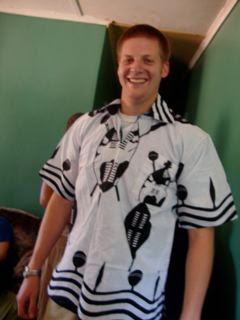This is the point in the trip when people start talking about the foods they are missing back home: french fries, ice cream, brownies, and potato chips have all made the list. We continue to be fed VERY well here, so this is in no way a reflection on the wonderful food we’ve been served, but rather of our own culture shock settling in a bit deeper.
I think a bit of the shine has started to wear off of our new, exciting experiences and we’re starting to be forced to come to terms with the expectations and assumptions that are being exposed underneath. This is a good and integral part of the learning process, but not nearly as fun as the “Oh!-Look!-Shiny!-Exciting!” first few weeks in a new culture. I would say we are now learning more about ourselves at a deeper level, as well. Unfortunately (or fortunately, depending on your perspective!), we’ll be leaving before a lot of the really difficult culture shock sets in, when it’s no longer exciting and unique (almost “quaint” by our Western standards) to have power outages every day, to shell even more peanuts, to eat the same foods almost every day. Soon we’ll have a bit of reverse culture shock and the huge supermarkets at home will no doubt overwhelm many of us!
We have so very much to learn, and we can only really begin to scratch the surface of it during our three weeks here. Regardless we are VERY thankful for the privilege of the lessons we have learned in these few short weeks! In fact, one of the greatest lessons I think we’ve learned (or been reminded of) is that we are extraordinarily privileged indeed. What are we going to do with our newly understood privilege? That will be a topic of on-going conversation during the next week as we begin to prepare to leave this beautiful place!

Speaking of food and privilege, we were extremely honored to be invited to eat lunch at Vera the dressmaker’s home this afternoon. All 23 of us were welcomed eagerly by our vibrant hostess as we squeezed into her cozy living room. A number of students modeled outfits they ordered (see the end of this post for a few examples!), and Vera made notes for some slight alterations on a few. Then, the feast began! Vera treated us to an amazing array of delicious foods – from Zambian basics (cornmeal and cabbage) to American foods (mac and cheese that made Kenny so excited he almost cried!). Everything was so good! Then she brought out the fruit salad (this almost made me cry: fruit salad!!!) and cake. We walked away full – not just physically but also emotionally as Vera invited (nearly begged!) us all to stay in Zambia! Oh, that we could!
During class this afternoon we discussed the complexities and challenges of drugs (and drug companies) in the developing world. We learned that there are over 60,000 marketed drugs in the United States versus only 2,000 in Norway/Sweden and 15,000 in India. Why ever do we need so many drugs in the US? What is the role for traditional herbal medicine? Of the 25,000 to 75,000 species of plants being used in herbal medicine, only 1% have been evaluated for efficacy. We also discussed tuberculosis (TB) and its huge burden in the world. Two billion people are infected with primary TB, and around 8 million develop the active disease annually, causing 2 million deaths per year. TB is also often the cause of death in HIV patients, whose immune systems cannot fight the disease.
We had the privilege of hearing from someone this evening who is living with HIV in Zambia. Through her inspiring story, she reminded us that every single family in Zambia has been affected in some way by HIV or AIDS. There is a saying about HIV here in Zambia that goes, “You’re either infected, or you’re affected.” When the Macha Mission Hospital opened their ART Clinic for HIV/AIDS care and research about five years ago, they expected the number of patients coming through the doors to eventually slow. That has not been the case. There are well over 4,000 people in the Macha area living with HIV, and more keep coming to the clinic every week. (And there are, no doubt, many who have not yet come to the clinic for fear of the stigma of having HIV.) While ARV drugs have helped people with HIV live longer, this entire area has obviously been very affected by this terrible virus and disease.
For those interested in further reading on the subject, I’m almost finished reading “28 Stories of AIDS in Africa” by Stephanie Nolen and highly recommend it. It is disturbing and unsettling in all the ways a book about the devastation caused by AIDS should be.
It is nearly impossible to believe that tomorrow is our last day of class! The students will then begin studying for their final exam on Monday, and then we’re off on safari for a few days before flying home at the end of the week!




No comments:
Post a Comment